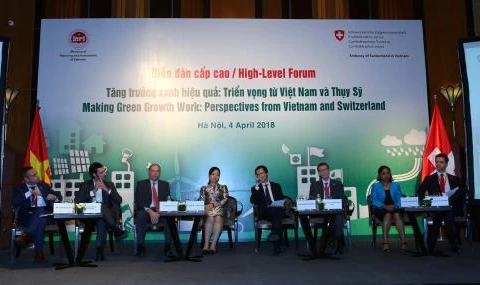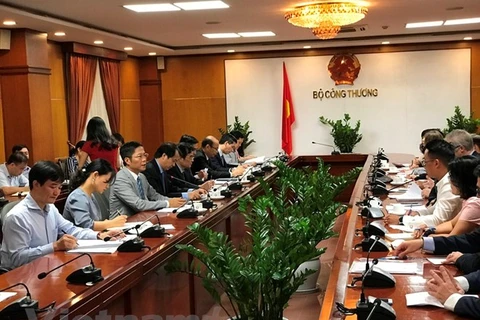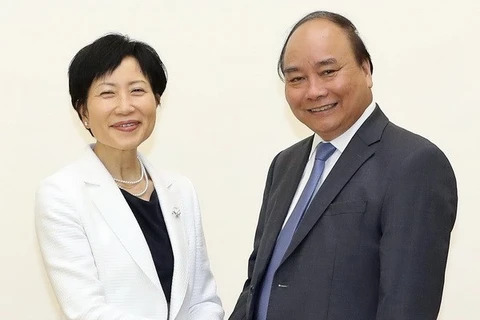Hanoi (VNA) - The European Union (EU) and France, through the French Development Agency (AFD), recently offered 20 million EUR (23.6 million USD) in aid to Vietnam to help improve resilience, water and natural resources management.
On May 11, Ambassador of the EU to Vietnam Giorgio Aliberti and AFD Director in Vietnam Fabrice Richy signed an agreement to enhance cooperation to improve resilience to climate change and natural disasters in Vietnam, moving towards a “green future”.
Under the agreement, the EU will provide a non-refundable aid of 20 million EUR for AFD.
Via coordination with central and local authorities, AFD will call on the Water and Natural Resources Management (WARM) Facility to prepare and launch projects co-financed by AFD’s loans and Vietnam’s resources during the 2011-2029 period with total estimated capital of 200 million EUR.
As planned, the WARM will back the preparation and implementation of more strategic projects, including “hard” and “soft” infrastructure in the management of water and natural resources, as well as in response to local challenges such as flooding and coastal erosion.
Additionally, experience gained from projects will contribute to the process of strategic policy dialogue on climate, environment and natural resources management.
Ambassador Aliberti said climate change adaptation plays a significant role in the sustainability of Vietnam’s development, in which water and natural resources are a key element.
The intention of the new grant is to support Vietnam on the road to a greener and more resilient future, in line with the EU’s global priorities on international partnerships with requirements for green agreements, he added.
The strengthening of natural resources management will help restore and preserve ecological systems, enhance resilience of local residents and mitigate the impacts of COVID-19, Aliberti said.
AFD Director in Vietnam Fabrice Richy said WARM directly meets the demands of the Vietnamese partners, including beneficiary provinces by stepping up strategic projects and funding studies during preparatory and technical support stages.
These projects are a focus of French cooperation in Vietnam, especially via priorities on cities and localities’ adaptability with climate change and natural disasters, integrated water and coastal area management, which is an added value for parties concerned.
Vietnam is one of the countries hardest-hit by climate change and disasters. Over the past three decades, abnormal weather conditions caused by climate change resulted in 500 deaths on average per year and economic loss equivalent to 1.5 percent of the national gross domestic product.
Additionally, rising sea level and temperatures coupled with increasing frequency and intensity of extreme climatic conditions, strong population growth and urbanisation are increasing the risk of coastal erosion, urban flooding and drought in the region.
This is evidenced by the early and prolonging arrival of salinity season in the Mekong Delta, forcing six provinces of Tien Giang, Ben Tre, Long An, Kien Giang, Ca Mau and Soc Trang to declare a state of emergency. Saltwater intrusion damaged 43,000ha of rice and left 80,000 households in the region in a shortage of water for daily use.
According to meteorological experts, dry-saline levels are sometimes more intense than the record levels recorded between 2015-2016.
In line with international commitments on climate change and the Sustainable Development Goals, the EU and AFD are actively helping Vietnam in the field of energy transition mitigation and climate change adaptation.
Vietnam has confirmed a strong commitment to joining the international community’s efforts to cope with climate change and enhance cooperation with other countries and international organisations, and seeking international support for its climate change response.
The Mekong River Commission (MRC) said on April 30 that water levels along the vast majority of the lower Mekong basin have now returned to normal their long-term average, but are still lower than they were during the 2018 and 2019 dry seasons.
The MRC Secretariat’s Head of Regional Flood and Drought Management Lam Hung Son said the region has seen quite a good amount of rainfall since the third week of April even though its total accumulated volume is only at an average level.
The MRC also said the Mekong region is now affected by a transition between the El Nino and La Nina weather systems.
It noted in its statement that rainfall will be uneven from May to July in Cambodia, Laos, Thailand, and Vietnam./.
























